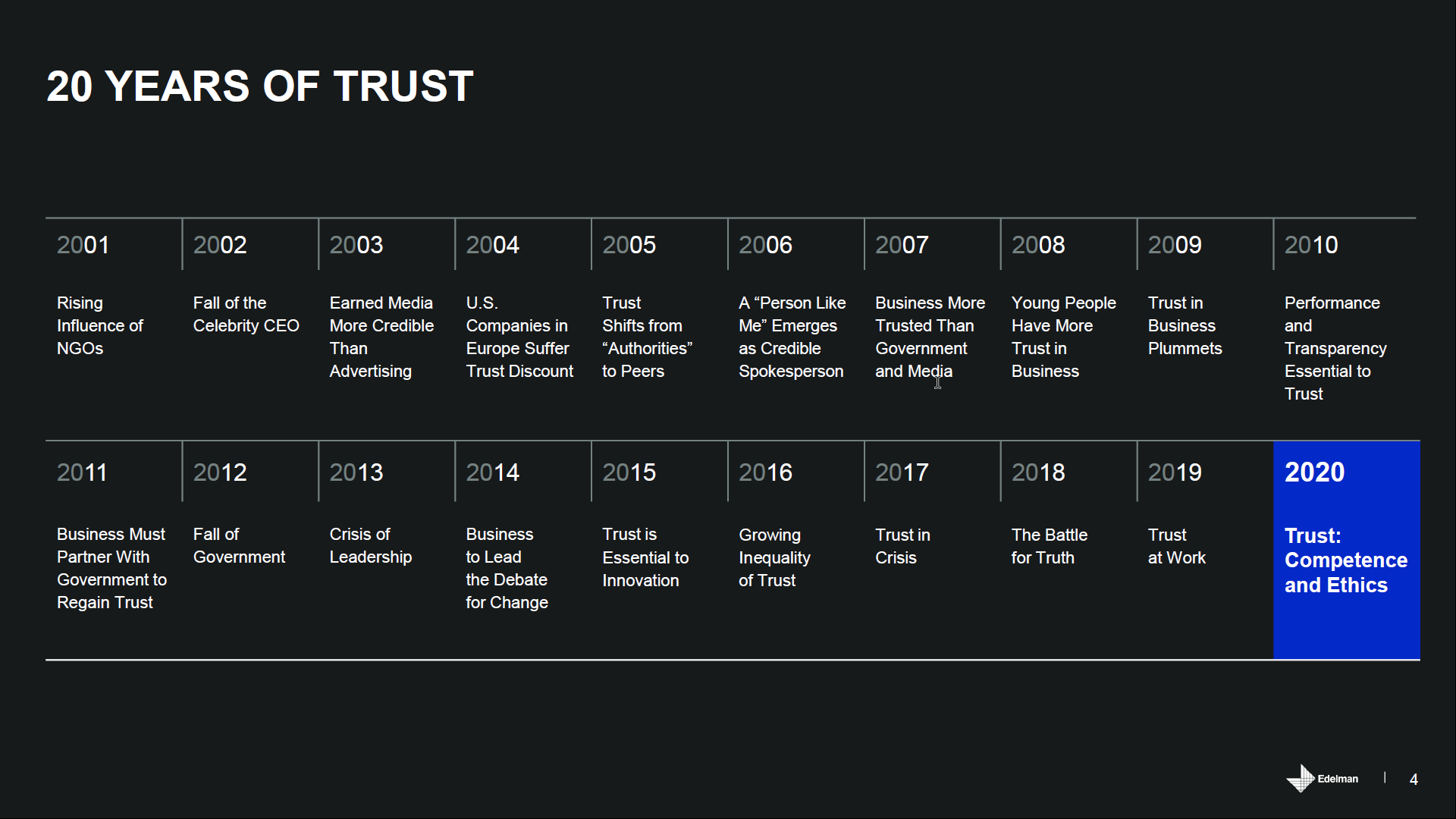Reputation and Trust – inextricably intertwined twin issues of leadership
Why putting stakeholder reputation and trust at the centre of business and marketing strategy matters even more in 2020
January has become a milestone moment for those who watch how Reputation and Trust are evolving in our ever-faster changing world. At the start of each year, we see two key studies appear.
Together they are transforming our understanding of how Reputation and Trust in organisations interact.
They show how the perceptions of the population are changing in relation to the institutions that matter most in their lives, and how leaders are recognising such changes.
With the economic and political turbulence of the past couple of years, it came as no surprise that these are communicating stronger messages than ever and are in increasing accord with one another.
The decline and fall of Trust
The Trust Barometer report launched each year during Davos has been running for 20 years. It constantly shows very clearly that leaders in government, business and the media must all step up to the mark much better.
The 2020 report is a little chilling.
It reveals that more than 2m people from all around the world are facing fear that is eclipsing hope. It’s thanks to the ‘backdrop of growing cynicism and the fairness about our current economic systems’ says the report – with a litany of reasons cited by respondents as to why they just aren’t feeling positive.
They need all the world’s institutions, including businesses, to help them find hope and confidence again.
[Editor’s note: and remember, this was BEFORE the spectre of COVID-19 reared it’s head)
What Reputation and Trust means to leaders
What does this translate into for leaders looking to better manage their reputation? A higher standard, perhaps. Certainly it a strong wake-up call about how critical it is to consider how all stakeholders feel. Customers have to trust you. So do employees (and future employees). You need your investors. And your partners. And the media. Hell, you need them all if you’re to succeed and sustain your sales, your capital and your reputation.
The Global Trends in Reputation report is another one to watch, revealing more and more value each year. It focuses on similar questions, but turns them towards the leaders of organisations, instead. What we see even more clearly this year, is that it is a strong reflection of the report. It seems that smart leaders are realising just how vital it is to turn the tide on Trust.
TOP 10 REPUTATION TRENDS 2020
The top 10 Reputation trends revealed by in the 2020 Trends in Reputation Report were:
Higher purpose – the need to deliver more than products/services
Data protection – the threat continues to rise, and you’re expected to act
Responsible investing – conscientious and considered financial decisions
Impact of technology – from AI to IoT and drones, the 4th industrial revolution is underway
Climate change – firmly on the agenda – because now it’s an expectation from all
Influencers – the rise of extraordinary influence, held by a few
Mistrust of big institutions – exactly as the Trust report reflects
Sustainability & responsible sourcing – no longer an optional extra in the supply chain
CEO activism – the rise of leaders stepping forward on matters beyond business
Equality, diversity, inclusiveness – because the world is judging you on all of it
Reputation and Trust are in perfect tune, as this echoes the Trust Barometer, in which competence and ethics are highlighted as the most critical drivers of whether people grant institutions their trust – or not. And businesses, while seen as the most competent of the types, are shamefully sitting blow the waterline when judged on their ethics.
Imperatives to take action
The bells are clanging so loudly now. While businesses cannot necessarily make other institutions such as governments raise their own game, they can and must look to their own. Trust matters to those that matter to you. Reinforcing trust, behaving right, and embracing drivers that are beyond bottom line success must be central to 2020 business and marketing strategies alike.
You can find both studies available on line at these links:
FINAL NOTE:
I’ve been watching the Barometer with interest for many years, since growing the technology business at Edelman London at about the time it started.
For me, one of the most fascinating pages of all is page 4 of the downloadable PDF report, which shows what has emerged each year as the primary issue.
That page is reproduced here without explicit permission but with huge admiration for a sustained effort in tracking such an important issue – and I strongly recommend you visit the report itself to get the full picture:
Excerpt from Global Trust Barometer 2020 (c) Edelman IntelligenceIs your reputation governance in good shape? Don’t let your own stakeholder trust be a risk you ignore. Get in touch if you’d like to explore what is possible.


